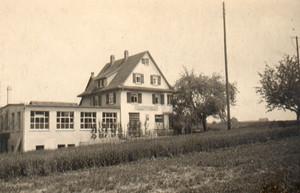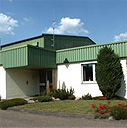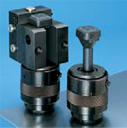The History of Güthle

Rosswälden, 1925.
Around 400 people lived in this well-hidden village on a ridge above the Fils river. Agriculture was the predominant industry, but the new era had long since been born, and people could hear the hammering of machines from the valley below. Industrialisation gained traction with the expansion of the railroad across the Fils.
Here, between rural idyll and industrial dynamics, the young Karl Güthle established his locksmith's workshop. Here he laid the roots of a company which successfully asserted itself in the world market with its products of die clamping, transport, and exchange technology. Here the self-image of the company was founded, which combines hearty tradition with worldly progress.
From the beginning, there was no lack of work for the resourceful locksmith. Karl Güthle builtl circular saws and sugar mills and laid water pipes in cowsheds and farms. Rosswälden had finally been connected to the water network of the adjacent Wellingen 13 years previously. After three years, the locksmith's shop was bursting at the seams. Karl Güthle moved to a new location and expanded his product range. The range of mills offered was also expanded.
New offerings included presses for fruit processing and honing machines for butchers. Word spread quickly that good work was done in Rosswälden. Güthle moved into contract manufacturing, supplying clients such as the Zinser textile machine company and Dick, the Esslinger file manufacturer, with castings and metal parts. In 1934, Güthle won a new customer, Stahl, the Stuttgart manufacturer of sheet metal processing machines. Güthle manufactured whole machines and assemblies for the first time for Stahl.
After the war, Karl Güthle used the knowledge he had acquired with Stahl to start his own production of sheet metal processing machines. He employed twelve employees at this time.
In 1964, Walter Güthle, the founder´s son, took over the company. He established representations in Austria, Switzerland, Norway, and Finland. Güthle provided two or three machines to South Africa weekly.
This chapter of history ended in 1973.








